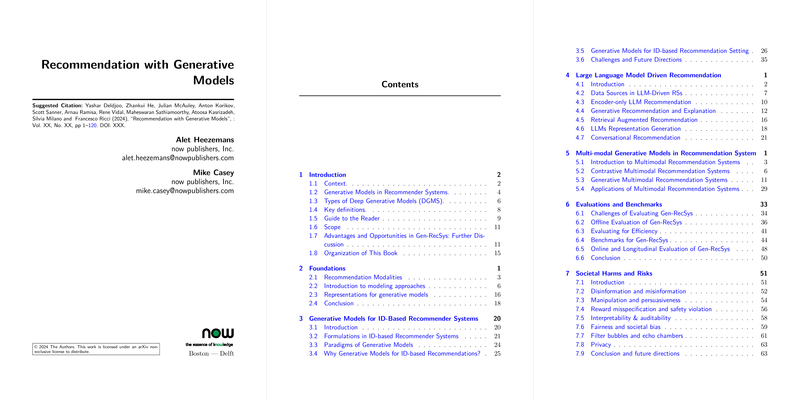Recommendation with Generative Models
The paper "Recommendation with Generative Models" authored by Yashar Deldjoo, Zhankui He, Julian McAuley, Anton Korikov, Scott Sanner, Arnau Ramisa, Rene Vidal, Maheswaran Sathiamoorthy, Atoosa Kasrizadeh, Silvia Milano, and Francesco Ricci, explores the application of generative models (GMs) within recommender systems (RSs). This insightful work traverses various facets of using deep generative models (DGMs) to enhance and innovate traditional recommender systems, offering a comprehensive view of the opportunities, challenges, and implications posed by this integration.
Overview
The document meticulously categorizes the types and modalities of generative models utilized in recommender systems. It assesses the value added by these models through illustrative case studies, explores methodological approaches, and confronts the societal and ethical ramifications of deploying such advanced AI-driven systems.
Key Contributions
- Generative Models in Recommender Systems The paper begins by contextualizing the advent of generative models within machine learning, underscoring breakthroughs facilitated by models like GANs, VAEs, diffusion models, and transformer-based architectures such as GPT and LLMs. These models enable the generation of high-quality synthetic data which disrupts conventional RS paradigms by introducing capabilities for personalized content creation and more nuanced user interactions.
- Applications and Benefits
- Enhanced Personalization: Generative models significantly enhance traditional RS tasks like top-k recommendations by leveraging probabilistic approaches to better capture the complexities of user-item interactions. VAEs, for instance, outperform fixed vector models like Matrix Factorization by interpreting user preferences within structured latent spaces.
- On-Demand Content Creation: The ability of these models to generate new items, explain recommendations, and personalize interactions in natural language leads to richer user experiences. For example, generative models in conversational systems can dynamically create dialogue tailored to user preferences and provide real-time critiquing.
- Data Augmentation and Cross-Domain Recommendations: Generative models address data scarcity issues, such as the cold start problem, by synthesizing new data points and bridging knowledge gaps across different domains.
- Methodological Approaches
- VAEs and Data Regularization: VAEs play a dual role by reconstructing user interaction vectors while regularizing models using simple distribution priors. Extensions like RecVAE and ACVAE illustrate how VAEs can be adapted to handle more complex scenarios.
- Auto-Regressive Models for Sequential Recommendations: Auto-regressive models (e.g., RNNs, Transformers) effectively predict next-item interactions by learning conditional probabilities. Generative retrieval models, which represent items with multiple subtokens, promise improved recommendation performance through better vocabulary efficiency and item similarity understanding.
- Diffusion Models and GANs: Diffusion models capture complex data distributions through iterative denoising processes, significantly enriching recommendation outputs with better synthetic data generation. GANs contribute by generating hard negative samples during training and providing high-fidelity content for visual recommendations like virtual try-ons.
- Societal Harms and Risks The paper also critically examines the societal and ethical implications of deploying generative RSs, scrutinizing potential harms and risks such as misinformation, privacy concerns, bias amplification, and manipulation. It argues for the necessity of robust evaluation frameworks that include both performance metrics and ethical considerations to mitigate adverse impacts.
Implications and Future Directions
The deployment of DGMs within RSs holds profound implications:
- Theoretical Insights: The integration of generative capabilities enriches our theoretical understanding of recommender systems by highlighting new dimensions in user interaction modeling and latent space representations.
- Practical Applications: In practice, these advancements can revolutionize industries reliant on recommendations, from e-commerce to media, by offering unprecedented levels of personalization and user engagement.
- Ethical Considerations: The paper underscores the need for continued research on the ethical deployment of these models. This includes developing methods to ensure transparency, fairness, and the prevention of societal harms.
Conclusion
"Recommendation with Generative Models" presents a detailed exploration of how DGMs can transform traditional recommender systems by enhancing personalization, enabling on-demand content creation, and addressing data scarcity. The paper provides a vital roadmap for both researchers and practitioners to navigate the complexities and embrace the opportunities brought about by generative models in RSs, while also emphasizing the importance of addressing the accompanying societal and ethical challenges. Future research should focus on refining these models and developing robust evaluation frameworks to ensure their responsible and effective implementation.
